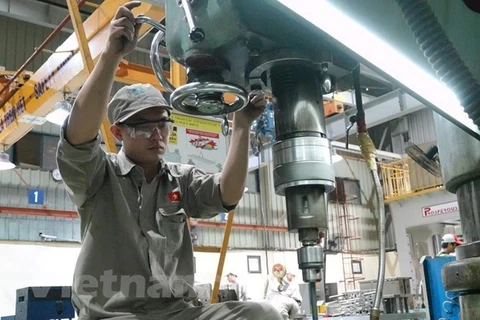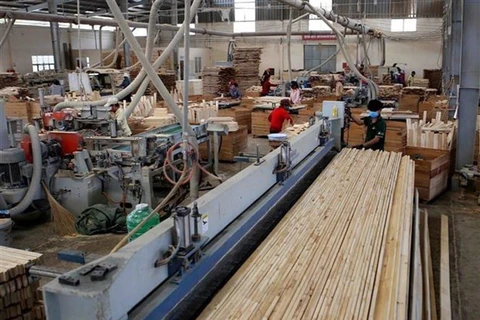 Vietnam’s export to other CPTPP members increase significantly in 2020 and the first quarter of this year despite severe impacts of the COVID-19 pandemic. (Photo: VNA)
Vietnam’s export to other CPTPP members increase significantly in 2020 and the first quarter of this year despite severe impacts of the COVID-19 pandemic. (Photo: VNA) Hanoi (VNA) – The Comprehensive and Progressive Agreement for Trans-Pacific Partnership (CPTPP) has created positive impact on Vietnam’s export since it came into force two years ago (January 14, 2019).
Tran Thanh Hai, Deputy Director of the Agency for Foreign Trade at the Ministry of Industry and Trade, highlighted the deal’s influence in institutional building and corporate operation in Vietnam.
The National Assembly, the Government, ministries and agencies have issued 16 legal documents to materialise commitments in the agreement, the official said, noting that the documents have basically met requirements of the pact, and been applauded by other CPTPP members.
 Tran Thanh Hai, Deputy Director of the Agency for Foreign Trade at the Ministry of Industry and Trade (Photo: VietnamPlus)
Tran Thanh Hai, Deputy Director of the Agency for Foreign Trade at the Ministry of Industry and Trade (Photo: VietnamPlus) The biggest results were recorded in export-import activities between Vietnam and the other 10 CPTPP members, especially those that yet to sign bilateral Free Trade Agreements (FTAs) with Vietnam like Canada and Mexico.
Last year, Vietnam shipped 4.3 billion USD worth of goods to Canada, an increase of 12 percent; 3.1 billion USD to Mexico, up 11 percent; and 1 billion USD to Chile, up 8.3 percent.
However, in fact, domestic firms, particularly small- and medium-sized enterprises, have met a range of difficulties during the implementation of the deal, the official pointed out.
They have not fully grasped commitments in each sector, he said, further explaining that to meet requirements in product origin, businesses in some cases need to make changes in supply chain and seek qualified materials.
The official said many local enterprises have also found it hard to access the market and promote trade, and suggested them optimise opportunities presented by the CPTPP to expand relations with partners.
The pandemic has affected trade promotion over the past time. Given this, the Ministry of Industry and Trade has organised online forums and exchanges to help businesses seek partners, according to Hai.
The biggest difficulty facing enterprises is the limited access to information. Therefore, the ministry has coordinated with the World Bank (WB) to launch an exclusive portal on FTAs, including the CPTPP.
The portal provides information regarding tax commitments, rules of product origin, services, investment, market and social responsibilities for businesses.
The Ministry of Industry and Trade has also partnered with other ministries and agencies, especially the Ministry of Agriculture and Rural Development, in negotiations and market opening to help agricultural products, particularly fruits, enter other CPTPP members.
The official stressed that the agreement has imposed strict technical barriers, notably to food and health products.
Hai also highlighted the significance of e-commerce, saying it would help Vietnamese firms seek new partners, especially those in America such as Canada, Chile, Peru and Mexico.
The CPTPP was signed by 11 member countries, namely Australia, Brunei, Canada, Chile, Japan, Malaysia, Mexico, New Zealand, Peru, Singapore, and Vietnam in March 2018.
It accounts for 13.4 percent of the global GDP and forms the third biggest economic bloc in the world, only after the North American Free Trade Agreement (NAFTA) and the European Union (EU).
In terms of commitments, the CPTPP has been evaluated by experts as the most forward-thinking and wide-ranging cooperation agreement at this time.
The UK made a formal request on February 1 to join the CPTPP, the first accession application by a member outside the 11 participating Pacific countries.
International Trade Secretary Liz Truss voiced the request in a videoconference with New Zealand’s Trade Minister Damien O'Connor and Japan's minister in charge of CPTPP negotiations Nishimura Yasutoshi.
Japan and other signatories have welcomed the new development, seeing it as an impetus to expanding free trade based on high-standard investment and trade rules.
China, the Republic of Korea, Taiwan (China) and Thailand have also expressed interest in joining the CPTPP./.






















